
Ninth summary – Adventurous march to Tsagaan Nuur, Khatgal and Mörön
N 49°01'460'' E 104°02'800''
Day: 440
Sunrise:
07:11
Sunset:
18:32
As the crow flies:
375
Daily kilometers:
400
Total kilometers:
2925
Soil condition:
Asphalt
Temperature – Day (maximum):
15 °C
Temperature – day (minimum):
minus 12 °C
Temperature – Night:
minus 3 °C
Latitude:
49°01’460”
Longitude:
104°02’800”
Maximum height:
1281 m above sea level
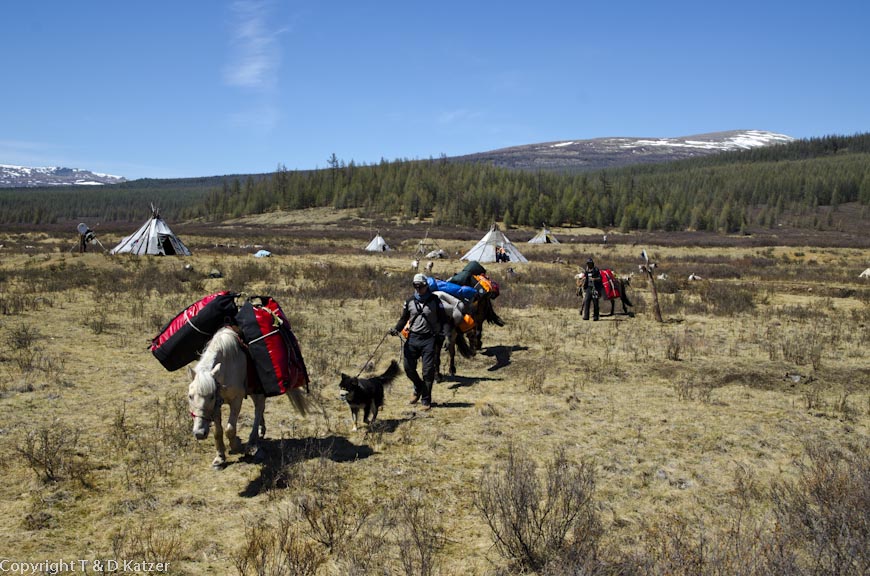
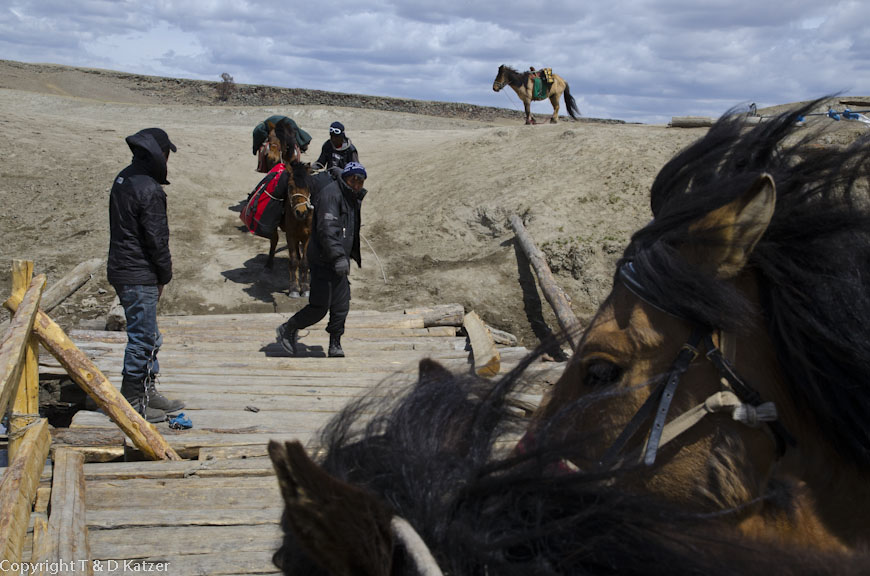

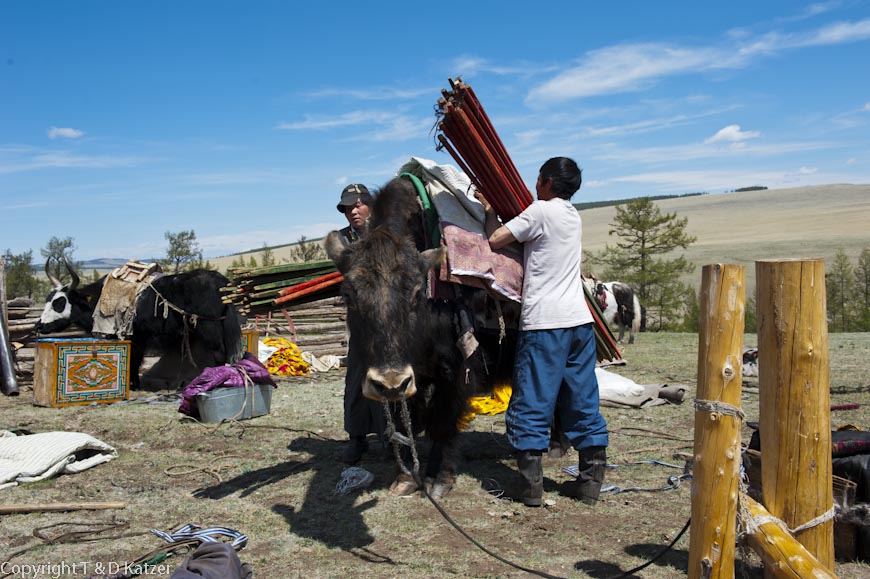
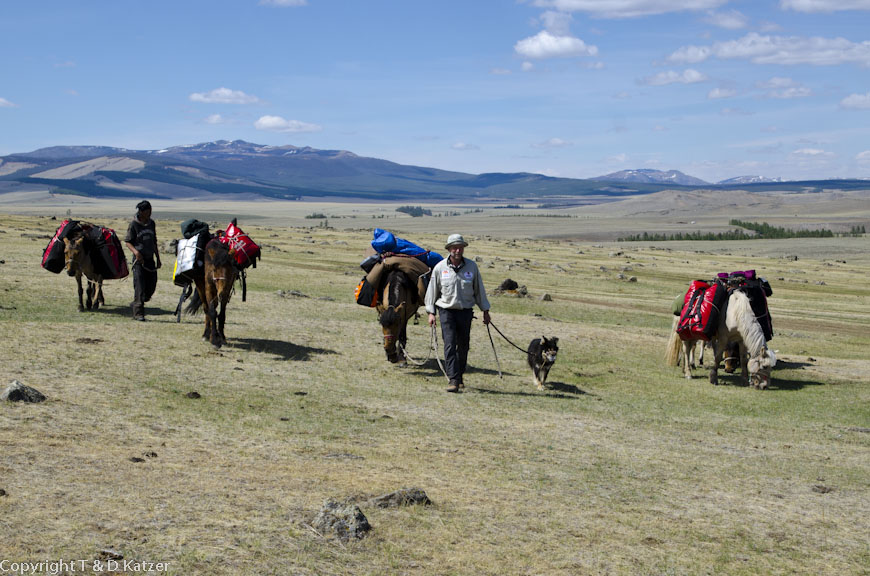
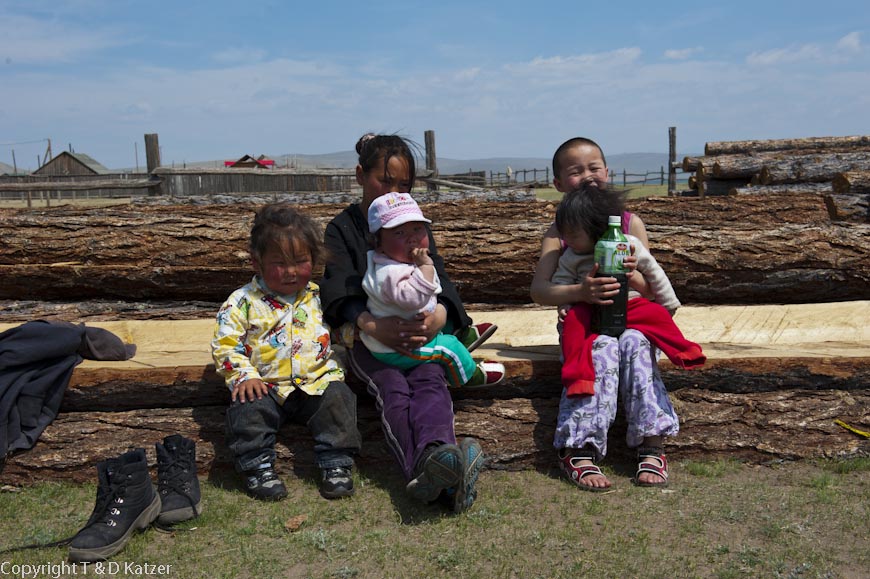


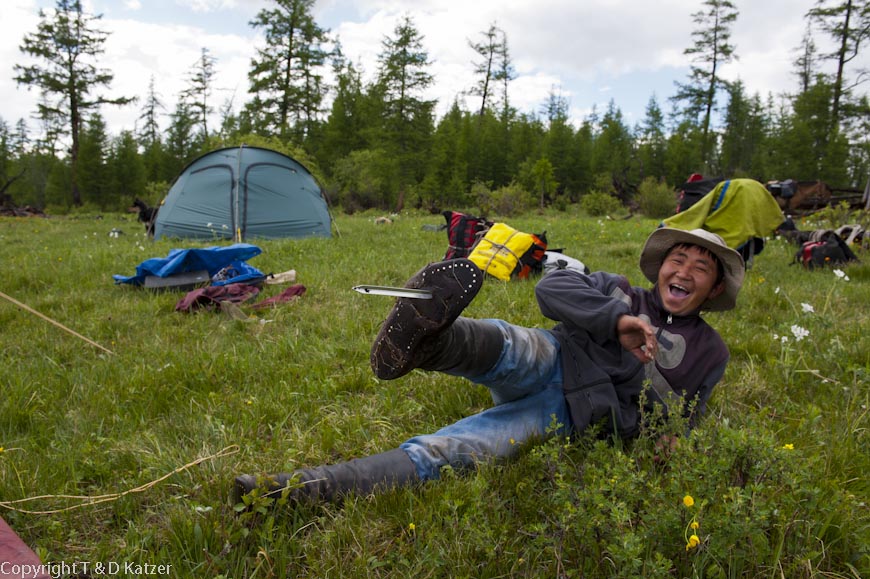


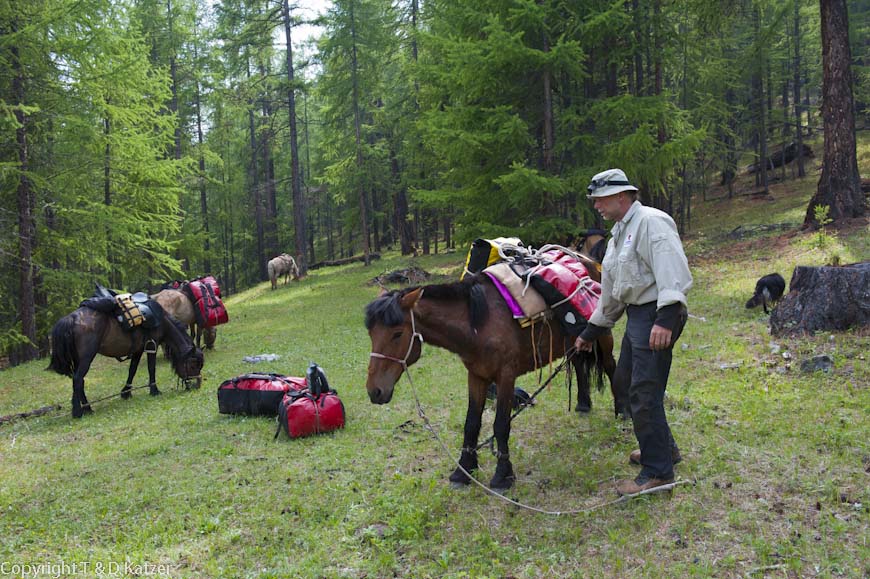

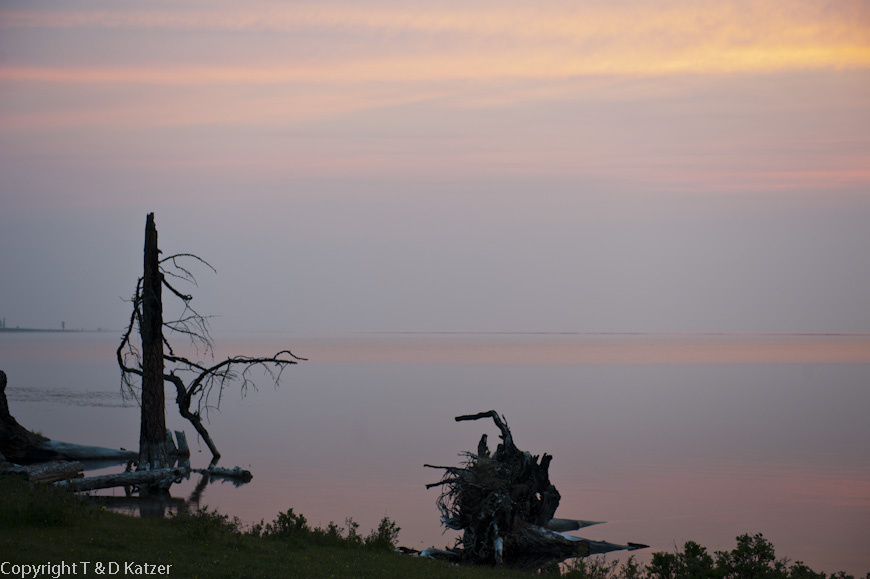
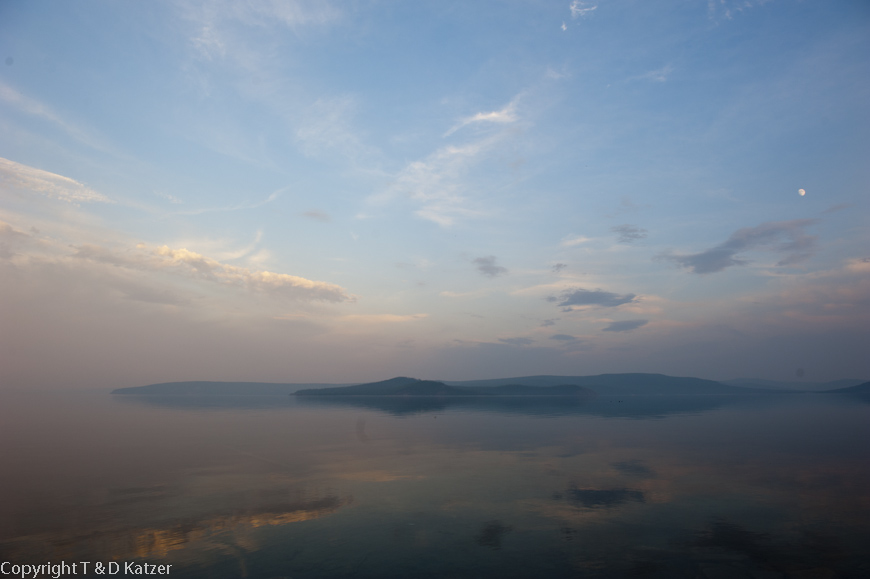


On June 8, we said goodbye to the Tuwanomads with whom we had lived for six months. After the long stay, I was no longer used to marching and after just a few kilometers I had open blisters and knee pain. The mountains around us were shrouded in smoke. One of Mongolia’s biggest forest fires had been raging for days, threatening nomads and travelers like us. Despite his muzzle, Mogi drove a sheep into a river and almost drowned the poor animal. From then on, he had to be kept on a lead again and pegged in front of the tent in the evening.
When we reached Tsagaan Nuur and tried to stay with Ayush, he tried to take advantage of our situation and demanded ten times the price for his old hut. Before I went after him, we left the inhospitable, greedy man and stayed with Shagai in his in-laws’ yurt.
While we were waiting for a new horse man, we defended Naraa, Tuya, Sar, Tenger, Bor and Sharga from stallions in heat and painted big suns on their rumps to make it harder for potential horse thieves to get hold of them after stealing them.
Odonbaatar’s face spoke volumes. “A long drive and looking too deeply into the bottle to say goodbye,” was my first diagnosis. Scars and an injured ear were evidence of a few scuffles. At around 1.68 meters and with an extremely slim body, the new horseman was a relatively small person. Before Bilgee said goodbye to us, he instructed him in his duties of the night watch shifts, taking care of the horses, and so on. Odonbaatar promised to do everything that was asked of him. Even in the first few days of our time together, his work ethic left a lot to be desired. It wasn’t long before he was doing whatever he wanted, mainly lazing around and sleeping. It took us longer than planned to get to the next small village, Ringinlhumbe, because the new man took us in circles so that he could visit relatives. It was hair-raising. When we reached the village in heavy rain, he disappeared for the whole night, so we also had to take over his horse guard. The idea of moving on without this good-for-nothing quickly came to mind.
With the help of Saraa, we organized new horsemen. Fifteen-year-old Bumbayr and his 25-year-old uncle Khurgaa. Both were eager for adventure and wanted to guide us through the upcoming horse thieves’ territory. What a satisfaction it was to be able to tell Odonbaatar, who reappeared the next morning, that he no longer needed him.
A few days later, we continued the ride with our new boys to cross the Khoridol-Saridag mountain range, which is up to 3,000 m high and on the other side of which was the beautiful Chuvsgul Nuur.
Strong spring thunderstorms rolled over the mountains and flooded the valleys. It rumbled and thundered every day. It was wet and clammy in our tent, streams meandered through the awning. The work ethic of our new companions was poor from the very first day. What’s more, they were extremely ill-equipped for the nasty weather and were constantly freezing. They quickly lost their thirst for adventure and soon realized how painful and exhausting such a trip could be. When the two of them started refusing to be photographed, we once again reached the critical point. Although I spoke to them with the tongues of an angel and explained how important photos were for our documentation, they persisted. Without a doubt, we went from the frying pan into the fire with them.
The challenges were one after the other. One morning, boron went haywire, hurling its cargo into the air and destroying one of our valuable solar panels. “You loaded it wrong,” Khurgaa reproached me.
The path was muddy and wound its way up the mountains. The horse’s legs stumbled unsteadily through deep mire, over massive root networks and sometimes coarse rock. We rode along the rushing water of a river that had frozen over in winter. Like a ravenous snake, it wound its way through the narrowing valley. Again and again we had to cross its raging waters. In some places the ford seemed impassable and the water reached up to the animals’ shoulders. “Will the horses get through?” I asked doubtfully, as I had already experienced such strong currents sweeping away entire horses with their loads.
We rode slowly and carefully through the damp, boggy high valley that sloped towards the lake when it suddenly happened. Tanja disappeared abruptly from my field of vision because Naraa simply collapsed beneath her and fell on her side like a felled tree. “Oh God!” I gasped, but saw how Tanja was already back on her feet. “Have you hurt yourself?” I asked. “No, but Naraa is sinking into the mire!” she shouted indignantly. We joined forces and tried to free the poor animal, but without the slightest success. It took a long time before we were able to free them from the treacherous bog hole in a joint effort with a smacking noise.
With every kilometer we rode, we got a little deeper and approached the pearl of Mongolia, Lake Khuvsgul. The alpine-like mountain landscape spoiled us with its extraordinary beauty in glorious sunshine. We roamed through sparse larch forests whose floors were covered with colorful carpets of flowers and lush greenery. Bees, horseflies, flies and other insects buzzed and buzzed through the warm air. Colorful butterflies danced from flower to flower. A wonderful idyll that was sometimes disturbed by loud, really awful, remarkably bad Mongolian rock music blaring out of Khurgaa’s MP4 player. Again and again I had to ask the young man to turn the thing off, but it never took long before the weird sounds once again disfigured the environment.
About 50 kilometers from Khatgal, one of Mongolia’s most notorious horse thieves’ villages, Khurgaa and Bumbayr were afraid that their mounts might be stolen. Without showing the slightest scruple, they demanded their money and left us in the lurch. We had been traveling with them for a week through deserted landscapes and just in the area where we urgently needed them as protection from the thieves, they made off.
Tanja and I developed a new watch system from that unforgettable day. We pegged Mogi in front of the tent entrance and in daily rotation either Tanja or I lay down under the canopy. If any thieves were to sneak up on us, Mogi would be ready to attack and Tanja or I would be on hand immediately to protect our horses. From the moment we were alone, the quality of our expedition changed. It intensified and helped us to achieve complete independence and freedom. The departure of the two boys turned out to be a real blessing in disguise.
We enjoyed the rest of the ride along Khuvsgul Nuur and the very next day we found a real fairytale camp on the densely wooded shore of the lake.
When we reached the village, the purest inferno raged above us. In just a few minutes, the skies opened up and flooded the land. The wet whipped us in the face and took away all visibility. Ideal weather to avoid being spotted by horse thieves. But we were sorely mistaken.
About 10 km behind Khatgal we set up camp at the foot of a 50 meter high rock face. With the massif at our backs and a stream in front of us, I was convinced that I had chosen a strategically good spot for the night.
At 10 p.m. we went into the tent. Tanja made herself as comfortable as possible in the awning. I lay in the sleeping cabin, the fabric door of which I left open so that I could jump out quickly in an emergency. I placed my weapons, the large knife, pepper gas and tracer pen, next to me. The stones I had collected were piled up to the right of the entrance.
It was 4:00 in the morning. Mogi barked as so often. Tanja got up, grabbed her headlamp and looked outside. “I don’t believe it. There are two riders coming,” she said in a tone that got my adrenaline pumping. Within a fraction of a second, I jumped out of my sleeping cabin next to Tanja, armed with pepper gas and a glow stick, and shone my light into the approaching dusk. Tanja’s beam of light hit one of the riders directly in the face. He held his hand in front of it. Both men rode right past us at a distance of about three meters. They didn’t make a sound. Only a few minutes later they turned their horses around and passed our camp again. It was clear to us that the men were observing the situation to see what their chances were of stealing our horses.
“Woof! Woof! Woof!” Mogi barked again moments later. This time the two scoundrels drove a herd of horses in our direction. Moments later, we hurried outside the tent again with our weapons. Tanja instinctively positioned herself between the tethered horses, while I knelt next to Mogi, who barked indignantly, ready to jump.
Loud neighing, the excited snorting of many nostrils and the cries of the supposed shepherds combined to form an unreal symbiosis of sound. The herd instinct made our horses want to follow their conspecifics. The ropes tightened. It could only take seconds for the strong pull to tear out the iron hooks hammered into the damp ground. If that had happened, the animals would have been lost to us. The thugs would have driven the herd a kilometer or two from the camp, jumped out of the saddle, separated our horses from the herd, grabbed them by the ropes and galloped off with them. We wouldn’t have had the slightest chance of catching up with them. An ingenious plan that we had absolutely nothing to counter. But it didn’t work, so they drove the herd of 40 horses into our camp again. This time we were ready to let our weapons do the talking and throw stones. They sensed our willingness to fight back and disappeared.
Because after the early morning attack we could no longer think of sleeping, we packed up our camp and fled. We soon trotted for 10 hours to put as much distance as possible between us and Khatgal. In the evening we found a wonderful hiding place on a river island of the Egin Gol, hidden from view from the outside. We stayed for three nights and two days to recover a little from the exertions.
On the seventh of July we reached a camp 10 km before Mörön, completely exhausted, on a huge pasture that stretched out in a wide valley basin. We actually only wanted to set up camp there for one night, but ended up staying for almost six weeks.
We look forward to your comments!

